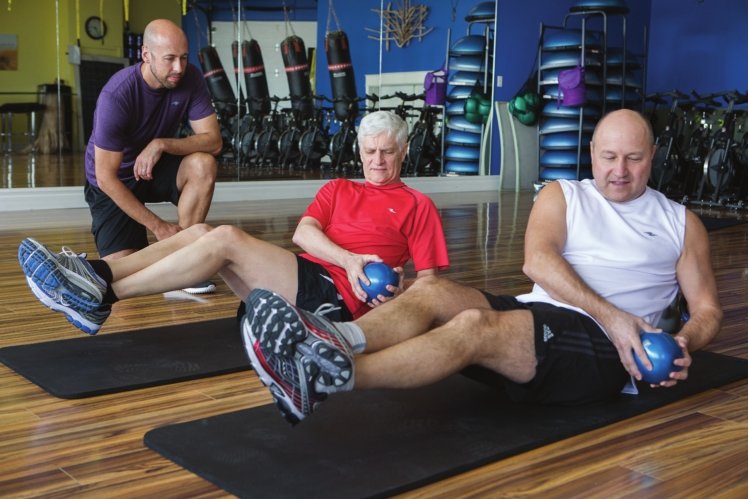
Staying healthy and active is important at any age, but it’s especially important as we get older. People over the age of 50 face increased physical and mental health challenges, and staying active can help ward off many of the negative effects of aging. City Pulse has compiled some of the best tips for staying healthy into your golden years.
Stay active: Finding ways to stay physically active is important for both physical and mental health. Experts suggest at least 30 minutes of exercise per day to stay fit and combat conditions like heart disease. That may involve a change in routine, even for active people. High-impact exercises like running or aerobics can be tough on aging joints. You may find that you need more time to warm up before exercise or need a longer recovery time after.
Swimming and other aquatics activities provide good exercise and put less stress on knees and hips. Many fitness and senior centers offer classes like gentle mat or chair yoga to minimize joint stress.
“We offer a lot of low-impact good cardio,” said Cherie Wisdom, coordinator of Meridian Senior Center. “It’s great for people who have had knee or hip surgery.”
The National Institute of Health warns that lack of physical activity often leads to more doctor visits and hospitalizations. A healthy exercise program, on the other hand, has been shown to combat the effects of arthritis and diabetes.
“Being active increases longevity and quality of life,” said Justin Grinnell, owner of East Lansing’s State of Fitness. “There are studies out there showing that movement delays the onset of things like Alzheimer’s disease and dementia.”
Grinnell also encourages seniors to look into strength training. As bodies age, there is a natural loss of muscle mass, which can lead to other health issues. Building muscle mass can improve balance and bone health and decrease joint pain.
“Any movement is good, but strength training is the fountain of youth,” Grinnell said.
Eat healthy: As the body ages, nutritional needs change. People over 50 generally need to consume fewer calories because they aren’t as active. But it’s important to eat a balanced diet that includes fruits, vegetables and lean proteins like fish and poultry. While Wisdom recommends daily multi-vitamins, a balanced diet can provide many of the same benefits.
“Whenever possible, the best option is to eat your vitamins,” Wisdom said. “Your body absorbs nutrients better when you consume them as food.”
Taking calcium and vitamin D can help bone strength, and adding fiber to your diet can help with digestive and intestinal problems. Nutrient-rich unsaturated fats, like those found in nuts, olives and fish, can help guard against stroke and improve neurological health. Educating seniors on recent food research is an important part of Grinnell’s mission.
“Some of the information they have is really outdated,” he said. “We used to think eggs were bad for you, but now we know they’re not so bad.”
It’s also important to drink more water. As you age, your body may not signal it is thirsty as well as it once did. It’s possible that you may not recognize when you are thirsty or dehydrated. The Mayo Clinic recommends around nine to 10 cups of water per day to remain hydrated.
Retirement is also a great time to improve your cooking skills. Cooking classes are a good way to learn about new foods, and they also provide a social outlet.
“We provide food, but we also provide education,” Wisdom said. “A lot of times, people come in for meals after their spouse dies. They don’t have any experience cooking meals.”
Stay social: Finding ways to stay socially active is also important to healthy living. Activities like playing cards, group meals or attending community events can actually improve your health.
“Keeping socially engaged is important,” Wisdom said. “It not only helps fight depression and other mental health issues, it also improves your physical health.”
Feelings of loneliness and isolation can start a chain reaction where depression leads to less physical activity, which leads to increased risk of health problems. Social activities can combat that sense of loneliness. Studies suggest that social interaction can lower blood pressure, which lessens the risk of cardiovascular problems.
Exercising with a group can combine the best aspects of exercise and social interaction.
“It’s tough to do things alone,” Grinnell said. “When you sweat together, it’s easier.”
As you build relationships, it gives you another reason to stick to your exercise routine.
“Now you’re not just going for yourself,” Grinnell said. “You know you’re going to see people you know — and they’ll know if you don’t show up. It keeps you accountable.”
Stop bad habits: It’s important to quit bad habits like smoking and excessive drinking, which can increase your risk for heart disease and other health problems. It’s also a good idea to avoid soft drinks and other sugary drinks, which provide empty calories with little nutritional value.
Sugary drinks increase the risk of diabetes and damage teeth, and studies suggest they contribute to osteoporosis. Even diet sodas, which are lower in calories and sugar, can contribute to dehydration.
Juices, lightly sweetened iced tea and decaffeinated coffees are healthier alternatives to soda. For that carbonated kick, try mixing a splash of real fruit juice with sparkling water.
Support City Pulse - Donate Today!
Comments
No comments on this item Please log in to comment by clicking here